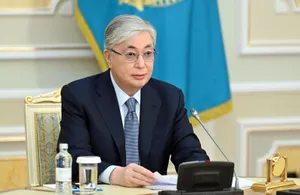ASTANA (WNAM MONITORING): President Kassym-Jomart Tokayev underscored the historic significance and complexity of Kazakhstan’s upcoming parliamentary reform during the first meeting of the working group on parliamentary reform held on Oct. 14.
Opening the meeting, Tokayev said the reform, which he announced in his September state-of-the-nation address, is one of the most critical stages in the country’s ongoing political modernization, according to Akorda.
“Parliamentary reform is an exceptionally important and challenging task facing our country. It directly affects the fate of the nation and our people,” he said.
President Tokayev noted that Kazakhstan continues to advance large-scale political and socioeconomic transformations. Under this effort, the presidential system will remain central, while the planned transition to a unicameral Parliament reflects both domestic political logic and global trends, as two-thirds of countries worldwide operate under similar parliamentary structures.
Tokayev emphasized that the reform process must be carefully prepared and broadly discussed, involving representatives of Parliament, the government, political parties, academia, and civil society.
He cautioned against rushing major constitutional changes, noting that the reform will require amendments to nearly 40 articles of the Constitution and aligning more than 60 laws and codes. He highlighted that this will be “a process comparable to adopting a new Constitution.”
Key conceptual aspects of the reform
President Tokayev outlined several key conceptual aspects of the reform. All reforms must be carried out in an evolutionary manner, taking into account citizens’ current demands, national specificities, and the country’s fundamental interests. Also, parliamentary reform is not merely about dissolving the Senate, but represents a profound transformation of the entire representative branch of government.
President Tokayev noted that parliamentary reform is closely linked to broader changes taking place in the country: economic, social, and technological. Particular attention is given to digitalization and the introduction of artificial intelligence, which will transform public administration systems worldwide.
He highlighted that Kazakhstan is moving toward the creation of an e-Parliament, a digital legislative platform that will make lawmaking more efficient and open new avenues for citizen participation. The transition to a unicameral Parliament, he emphasized, will help the country adapt to new conditions and the accelerated pace of decision-making, while maintaining the highest quality of adopted laws.
Tokayev underlined that the professionalism of deputies will be the key factor in the success of this reform. Forming Parliament through party lists will help ensure a competent and qualified composition, while a multi-party system within a unicameral structure will promote constructive, professional dialogue, where responsibility and expertise prevail over populism.
Concluding his address, Tokayev called on the working group, comprising representatives of Parliament, the Presidential Administration, the government, political parties, lawyers, scholars, and public figures, to approach their mission with the utmost responsibility and professionalism.
“All proposals submitted through the e-Otinish and e-Gov platforms must be analyzed thoroughly. As a just state, we must consider every citizen’s suggestion that contributes to the common good,” he said.


